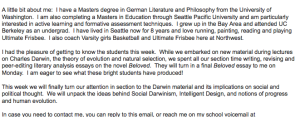H4 – Internship Entry
May 6, 2014 at 7:45 am | Posted in H4 | Leave a commentTags: Diversity, Effective Teaching Methods, H4, Internship, relationships
H4 – Honor family/community involvement in the learning process. In order to honor family and community involvement in student learning, communication and opportunities to participate have to be present. Moreover, communication is not a one-time deal, but an on-going process that needs nurturing and follow-up. In order to initiate communication with my students’ families at the beginning of internship, I crafted an email to send to parent/guardian figures, introducing myself and the content the class would be studying for the rest of the year. In the letter, I gave a bit of my own educational background and interests, so that parents might get to know me as an educator and a person. At the end of the letter, I included my contact information and invited parents to contact me with questions or concerns – either immediately or at any point in the coming months. In addition to this letter, I also attached the content document which I gave to students that outlined course content, daily expectations, and grading procedures. I wanted to give families the opportunity to know what types of texts and issues we would be studying, in order for them to support their children. An excerpt from the email can be seen below.
Honestly, I was expecting a few more responses than I received – only two parents emailed me back thanking me for the letter and introducing themselves. I did not ask for a direct response from families, so I cannot be disappointed in the lack of response, but I had assumed I was going to start a dialogue with more than two families. In the future, I think I will ask parents a specific question about their child, and in this way indirectly assess which parents received and read my email.
At this point, my second term (and the students’ last of the year) has just begun, and it is a great time to check in with families again. I will write another letter explaining our curriculum for the rest of the year, as well as giving parents an idea of how they can support their child’s learning. I will included the name of our big texts, Conrad’s Heart of Darkness and Kincaid’s Small Place, in case they want to be reading them simultaneously with our class. Also, I will suggest some casual “dinner table” discussion topics that are relevant to our class discussions like imperialism, moral/ethical dilemmas, otherizing, national and cultural identity. As Fay and Funk (1995) underline, the more a teacher can integrate academic literacy with home literacy, the better chance a student feels respected, supported and motivated to learn at school. I truly believe that students who grow up in home environments that value knowledge and learning are more likely to succeed in academic endeavors. While teachers cannot transform home environments to be more suitable to support school life, they can make connections with families and offer opportunities for involvement in their children’s education in non-threatening, respectful ways.
Resource: Fay, J. and D. Funk (1995) Teaching with love and logic: Taking control of the classroom. Golden, CO: Love and Logic Press.
Create a free website or blog at WordPress.com.
Entries and comments feeds.
